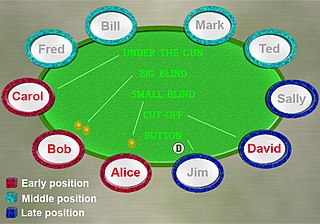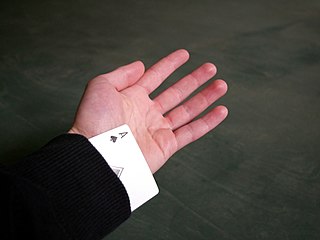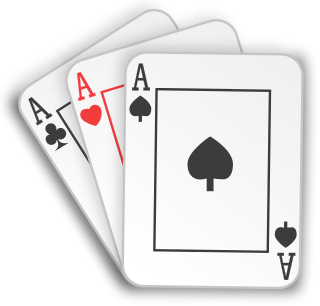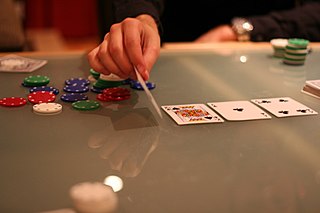Related Research Articles

Blackjack is a casino banking game. It is the most widely played casino banking game in the world. It uses decks of 52 cards and descends from a global family of casino banking games known as "twenty-one". This family of card games also includes the European games vingt-et-un and pontoon, and the Russian game Ochko. Blackjack players do not compete against each other. The game is a comparing card game where each player competes against the dealer.

Games available in most casinos are commonly called casino games. In a casino game, the players gamble cash or casino chips on various possible random outcomes or combinations of outcomes. Casino games are also available in online casinos, where permitted by law. Casino games can also be played outside of casinos for entertainment purposes, like in parties or in school competitions, on machines that simulate gambling.

Craps is a dice game in which players bet on the outcomes of the roll of a pair of dice. Players can wager money against each other or against a bank. Because it requires little equipment, "street craps" can be played in informal settings. While shooting craps, players may use slang terminology to place bets and actions.

Poker is a family of comparing card games in which players wager over which hand is best according to that specific game's rules. It is played worldwide, but in some places the rules may vary. While the earliest known form of the game was played with just 20 cards, today it is usually played with a standard deck, although in countries where short packs are common, it may be played with 32, 40 or 48 cards. Thus poker games vary in deck configuration, the number of cards in play, the number dealt face up or face down, and the number shared by all players, but all have rules that involve one or more rounds of betting.
Blinds are forced bets posted by players to the left of the dealer button in flop-style poker games. The number of blinds is usually two, but it can range from none to three. When there are two blinds they are called the small blind and the big blind.

In the game of poker, the play largely centers on the act of betting, and as such, a protocol has been developed to speed up play, lessen confusion, and increase security while playing. Different games are played using different types of bets, and small variations in etiquette exist between cardrooms, but for the most part the following rules and protocol are observed by the majority of poker players.

Texas hold 'em is one of the most popular variants of the card game of poker. Two cards, known as hole cards, are dealt face down to each player, and then five community cards are dealt face up in three stages. The stages consist of a series of three cards, later an additional single card, and a final card. Each player seeks the best five-card poker hand from any combination of the seven cards: the five community cards and their two hole cards. Players have betting options to check, call, raise, or fold. Rounds of betting take place before the flop is dealt and after each subsequent deal. The player who has the best hand and has not folded by the end of all betting rounds wins all of the money bet for the hand, known as the pot. In certain situations, a "split pot" or "tie" can occur when two players have hands of equivalent value. This is also called "chop the pot". Texas hold 'em is also the H game featured in HORSE and HOSE.

Cheating in poker is any behavior outside the rules of poker that is intended to give an unfair advantage to one or more players.

A poker tournament is a tournament where players compete by playing poker. It can feature as few as two players playing on a single table, and as many as tens of thousands of players playing on thousands of tables. The winner of the tournament is usually the person who wins every poker chip in the game and the others are awarded places based on the time of their elimination. To facilitate this, in most tournaments, blinds rise over the duration of the tournament. Unlike in a ring game, a player's chips in a tournament cannot be cashed out for money and serve only to determine the player's placing.

Card counting is a blackjack strategy used to determine whether the player or the dealer has an advantage on the next hand.
Spanish 21 is a blackjack variant owned by Masque Publishing Inc., a gaming publishing company based in Colorado. Unlicensed, but equivalent, versions may be called Spanish blackjack. In Australia and Malaysia, an unlicensed version of the game, with no dealer hole card and significant rule differences, is played in casinos under the name "Pontoon". It was first introduced about 1995.
Chinese Blackjack is also known as 21-point, ban-luck (Hokkien), ban-nag (Cantonese), and xì dách (Vietnamese). The game is played in South East Asia and resembles conventional Blackjack. In Malaysia, this variant is known as Kampung (Village) Blackjack to differentiate it from the standard Casino Blackjack, and it grew from the game played in the old days in villages.
Celebrity Blackjack is an American television show where celebrities played tournament style blackjack for charity. The show, which ran on Game Show Network, was hosted by Matt Vasgersian. Dave Stann was the dealer. Season 1 aired weekly from July 5, 2004, through August 9, 2004. Season 2 premiered October 12, 2004, and ran weekly through January 11, 2005.
The World Series of Blackjack is a televised blackjack tournament created and produced by the cable network GSN. It is a closed tournament; players are either invited to play or attempt to win a spot via a satellite tournament. Rounds are edited into 1-hour episodes and broadcast on GSN. Matt Vasgersian and Max Rubin provided commentary for the first two seasons. Tiki Arsenault was the dealer for Season 1 as Deanna Bacon was the dealer for Seasons 2 and 3 while Jessica Knight was the dealer for Season 4.
The table limit is the minimum and maximum bet that a gambler can make at a gaming table. It is a form of yield management in that the limits can be changed to optimize the profit from a gaming table. Gaming tables have a limited resource to sell: the seats used by the players.

Teen patti is a gambling card game. Teen Patti originated in India and is popular throughout South Asia. It originated in the English game of three-card brag, with influences from poker. It is also called flush or flash in some areas.

Malaysian Pontoon is a card game related to Pontoon and blackjack and, like those games, a descendant of Vingt-Un or Twenty-One. It is played by those in Australia, Malaysia and Singapore, where it is usually just called pontoon. This game is similar to match play 21 or Spanish 21, while original pontoon, played in Britain, holds closer to the traditional Twenty-One rules, but can be quickly distinguished by the use of the terms "twist" and "stick".
The following is a glossary of poker terms used in the card game of poker. It supplements the glossary of card game terms. Besides the terms listed here, there are thousands of common and uncommon poker slang terms. This is not intended to be a formal dictionary; precise usage details and multiple closely related senses are omitted here in favor of concise treatment of the basics.
Draw poker is any poker variant in which each player is dealt a complete hand before the first betting round, and then develops the hand for later rounds by replacing, or "drawing", cards.

Community card poker refers to any game of poker that uses community cards, which are cards dealt face up in the center of the table and shared by all players. In these games, each player is dealt an incomplete hand face down, which are then combined with the community cards to make a complete hand. The set of community cards is called the "board", and may be dealt in a simple line or arranged in a special pattern. Rules of each game determine how they may be combined with each player's private hand. The most popular community card game today is Texas hold 'em, originating sometime in the 1920s.
References
- ↑ "Blackjack Tournament Strategy Basics". BlackjackInfo.com. Retrieved 2010-06-17.
